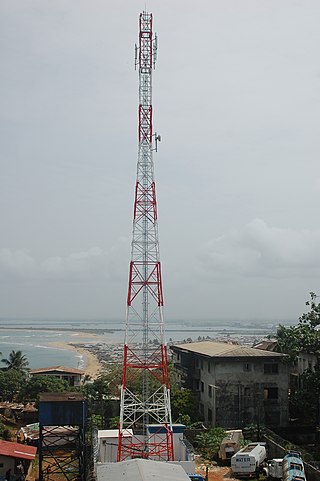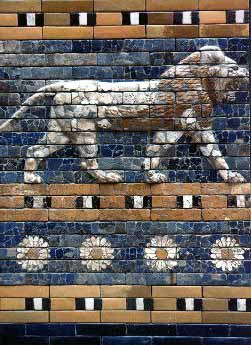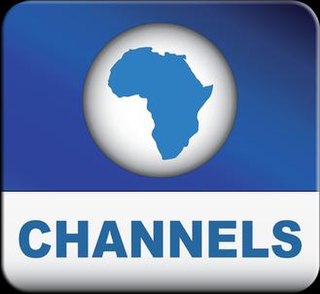Related Research Articles

Mass media in Liberia include the press, radio, television, fixed and mobile telephones, and the Internet.
Nigeria is Africa's largest ICT market, accounting for 82% of the continent's telecoms subscribers and 29% of internet usage. Globally, Nigeria ranks 11th in the absolute number of internet users and 7th in the absolute number of mobile phones.

Iraq was home to the first television station in the Middle East, which began during the 1950s. As part of a plan to help Iraq modernize, English telecommunications company Pye Limited built and commissioned a television broadcast station in the capital city of Baghdad. Following the 2003 US-led invasion of Iraq, the Iraqi state media collapsed. In June 2004, a Communications and Media Commission was set up to approve and grant license for all the country's media. By 2011, Iraq was the headquarters of 49 free-to-air satellite channels, one of the highest numbers in the region. Until 2003, satellite dishes were banned in Iraq, and there was a limited number of national terrestrial stations. After 2003, the sale of satellite dishes surged, and free-to-air channels entered the market. There are 17 terrestrial channels, of which one is funded by the US government through the U.S. Agency for Global Media (Alhurra-Iraq), and seven are owned by the state broadcaster Iraqi Media Network. In March 2011, Al Jazeera was granted rights to resume operations after being banned in 2004. Plans were established to set up a free-media zone based in Baghdad, the Baghdad Media City, by the end of 2014.
Digital terrestrial television is a technology for terrestrial television where television stations broadcast television content in a digital format. DTTV is a major technological advance over analog television, and has largely replaced analog television broadcast, which had been in common use since the middle of the 20th century. Test broadcasts began in 1998 with the changeover to DTTV, also known as the Analog Switchoff (ASO) or Digital Switchover (DSO), which began in 2006 and is now complete in many countries. The advantages of digital terrestrial television are similar to those obtained by digitizing platforms such as cable TV, satellite, and telecommunications: more efficient use of radio spectrum bandwidth, provision of more television channels than analog, better quality images, and potentially lower operating costs for broadcasters.

Africa Independent Television, also known by its acronym AIT, is a privately owned television broadcaster in Nigeria. It operates Free To Air in Nigeria as the largest privately operated terrestrial television network with stations in twenty-four out of thirty-six states in Nigeria. AIT is also broadcast via satellite television from its operational headquarters in Abuja. AIT is a subsidiary of DAAR Communications plc, available throughout Africa, and via Dish Network to North America.

MultiChoice is a South African company that operates DStv, a major satellite television service in Sub-Saharan Africa, and GOtv, a minor service operating in over nine countries of this area and Showmax service. MultiChoice was formed out of the subscriber-management branch of the M-Net terrestrial pay television company, and broadcasts the full range of M-Net channels on the DStv service. MultiChoice is owned by the media conglomerate of the same name. One of the subsidiaries of MultiChoice is DStv Now, renamed as DStv App, a service that delivers television transmission to mobile devices such as laptops, smart phones and notebooks.

The Nigerian Television Authority or NTA is a Nigerian government-owned and partly commercial broadcast station. Originally known as Nigerian Television (NTV), it was inaugurated in 1977 with a monopoly on national television broadcasting, after a takeover of regional television stations by military governmental authorities in 1976. After declining interest from the public in government-influenced programming, it lost its monopoly over television broadcasting in Nigeria in the 1990s.
Digital terrestrial television in Australia commenced on 1 January 2001 in Sydney, Melbourne, Brisbane, Adelaide and Perth using DVB-T standards. The phase out of analogue PAL transmissions began on 30 June 2010 and was completed by 10 December 2013.
Television in Pakistan started in 1964 and the first live transmission of Pakistan Television began on 26 November 1964, in Lahore.

Mass media in Sierra Leone began when the first modern printing press in Africa arrived at the start of the 19th century. In the 1860s the country became a journalist hub for Africa with professional travelling to the country from across the continent. At the end of the 19th century the industry went into decline and when radio was introduced in the 1930s this became the primary communication media. Print media is not widely read in Sierra Leone, especially outside Freetown, partially due to the low levels of literacy in the country. In 2008 there were 15 daily newspapers in addition to those published weekly. Among newspaper readership young people are likely to read newspapers weekly and older people daily. The majority of newspapers are privately run and are often critical of the government.

Mass media in Kenya includes more than 91 FM stations, more than 64 free to view TV stations, and an unconfirmed number of print newspapers and magazines. Publications mainly use English as their primary language of communication, with some media houses employing Swahili. Vernacular or community-based languages are commonly used in broadcast media; mostly radio.

The digital television transition, also called the digital switchover (DSO), the analogue switch/sign-off (ASO), the digital migration, or the analogue shutdown, is the process in which older analogue television broadcasting technology is converted to and replaced by digital television. Conducted by individual nations on different schedules, this primarily involves the conversion of analogue terrestrial television broadcasting infrastructure to digital terrestrial (DTT), a major benefit being extra frequencies on the radio spectrum and lower broadcasting costs, as well as improved viewing qualities for consumers.

Televisão Pública de Angola E.P. or TPA is the national broadcaster of the Southern African state of Angola. It operates two generalist television channels and a news channel. TPA is headquartered in the capital city Luanda and broadcasts in the Portuguese language.
I Need to Know was a Nigerian family-oriented television series aired on the Nigerian Television Authority network (NTA) that ran from 1997 to 2002. It starred Funke Akindele as Bisi, Uche Ejiogu as Ngozi, Taiwo Lesh as Hauwa and Amaka Egwuatu as Essien and was sponsored by the United Nations Population Fund.
TVC News is a Nigerian news 24-hour television news channel based in Lagos. The channel airs on British Sky Broadcasting Group Plc (BSKYb) in the UK, Naspers Ltd. (NPN)'s DStv and Startimes in Nigeria, and Multi TV in Ghana.

Channels Television is a Nigerian independent 24-hour news and media television channel based in Lagos, Nigeria. The parent company, Channels Incorporated, was founded in 1992, a year before the Nigerian government deregulated the broadcast media. It began broadcasting in 1995. Its primary focus is producing news and current affairs programs on Nigerian domestic issues. The Channel's mission is to act as a watchdog on governmental policies and activities.

Mass media in Tanzania includes print, radio, television, and the Internet. The "Tanzania Communications Regulatory Act" of 2003 created the Tanzania Communications Regulatory Authority, which oversees broadcast licensing. The Media Council of Tanzania began in 1995.
StarTimes is a Chinese electronics and media company in Sub-Saharan Africa.
References
- ↑ "World television day - History of TV". BusinessGhana. Retrieved 2020-05-27.
- ↑ Nwulu, Nnamdi I.; Adekanbi, Adeyemi; Oranugo, Tochukwu; Adewale, Yemi (November 2010). "Television broadcasting in Africa: Pioneering milestones". 2010 Second Region 8 IEEE Conference on the History of Communications. IEEE. pp. 1–6. doi:10.1109/HISTELCON.2010.5735315. ISBN 978-1-4244-7450-9.
- ↑ "50 years of television in Nigeria: So far, so good?". vanguardngr.com. 2009-10-24. Retrieved 27 October 2014.
- ↑ "Where Nigerian TV stations should go". The Punch. punchng.com. Archived from the original on 28 October 2014. Retrieved 27 October 2014.